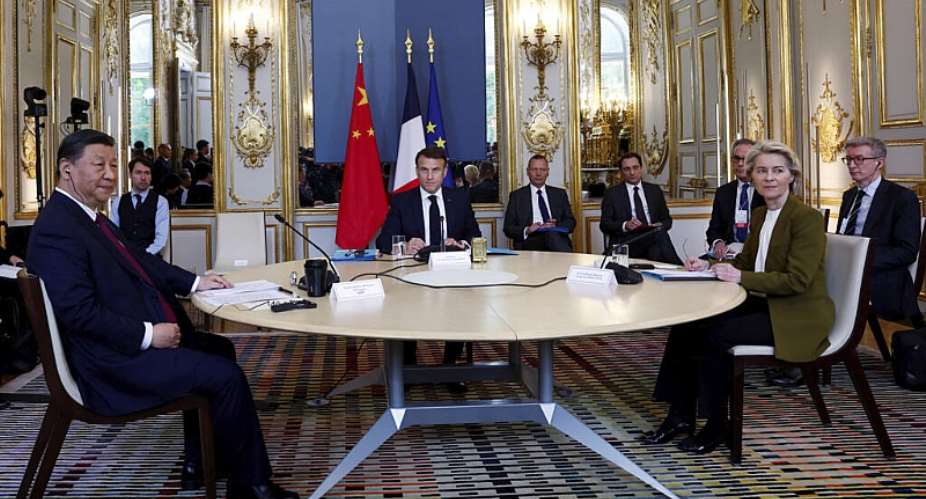French President Emmanuel Macron and EU Commission president Ursula von der Leyen pressed Xi Jinping at a summit in Paris on Monday to use Beijing's influence to halt the Russian war against Ukraine, also telling the Chinese leader to accept fair global trade rules.
Opening an initial trilateral meeting attended by European Commission president Ursula von der Leyen, Macron said coordination with Beijing on "major crises" including Ukraine was "absolutely decisive" and urged "fair rules for all" in Europe-China trade.
"The future of our continent will very clearly depend on our ability to continue to develop relations with China in a balanced manner," Macron said.
In an op-ed for Le Figaro daily, Xi said he wanted to work with the international community to find ways to resolve the conflict sparked by Russia's invasion of Ukraine, while emphasising that China was "neither a party nor a participant".
"We hope that peace and stability will return quickly to Europe, and intend to work with France and the entire international community to find good paths to resolve the crisis," he wrote.
Xi's choice of France as the sole major European power on his itinerary indicates the importance he now accords to Macron as an EU powerbroker.
Peaceful overtures
"It's not that long ago that we were seeing very aggressive Chinese foreign policy towards the West in general, including Europe, the so-called wolf warrior policy," China specialist Michael Dillon, author of the book We need to talk about Xi, and affiliated with King's College in London, told RFI.
"And here we've got Xi Jinping making really strongly peaceful overtures towards Europe."
Part of it, he thinks is "to encourage stronger Chinese relations with Europe, maybe hoping to divide it from the United States."
Market imbalance
When it comes to global trade, Von der Leyen said she will press for "fair" competition with China, adding that in previous talks with Xi she had "made clear that the current imbalances in market access are not sustainable and need to be addressed".
"We have been very clear-eyed about our relationship with China, which is one of the most complex, but also one of the most important," she said.
At the core of the current problems between the EU and China lies the issue of electric cars.
A surge in imports of Chinese electric cars into Europe has triggered EU tariff threats.
France did not wait for a European Union decision on implementing tariffs, instead redesigning its cash bonus scheme in December to exclude the purchase of models made in China, which had rapidly gained market share.
"Trade in general is a real problem," Dillon says, pointing out that "the electric vehicle seems to be a symbol of what the West fears about China.
"The basic argument is that China is subsidizing its industries and producing far more than it can consume in order to export. And that is damaging similar production in Europe and the United States."
After two days in France, Xi will continue his first European trip in five years to Hungary and Serbia.
Dillon describes this as an "odd choice", which has "more to do with China's relations with Russia than its relations with the West."
According to Dillon, Beijing is increasingly worried about Moscow's growing influence in Mongolia and North Korea, the last being always under a much stronger Chinese influence.
"I think the limits to the "limitless friendship" [between China and Russia, declared by Xi and Russian President Vladimir Putin declared in early 2022] are beginning to be visible," he says.
Hungary and Serbia "are among the more Russian countries in Eastern Europe. And I think that China is trying to impress on them the need for good relations with China as well as with Russia."
Xi Jinping and the Beijing elite are trying to play both the West and Russia at the same time, according to Dillon. "They want to appear as a responsible global power, offering some sort of a peace plan, offering mediation, while on the other hand, not wanting to break off diplomatic relations with Russia. So they're riding two horses at the same time."





 List of 24 ministerial nominees approved by Parliament
List of 24 ministerial nominees approved by Parliament
 You were my inspiration, made me who I am today – Lilian Kumah
You were my inspiration, made me who I am today – Lilian Kumah
 Rainstorm destroys Hohoe E.P. Senior High School building
Rainstorm destroys Hohoe E.P. Senior High School building
 John Kumah strongly supported me to become NPP flagbearer – Bawumia reveals
John Kumah strongly supported me to become NPP flagbearer – Bawumia reveals
 Late John Kumah urged me to run for NPP flagbearer, strongly supported me — Bawu...
Late John Kumah urged me to run for NPP flagbearer, strongly supported me — Bawu...
 Akufo-Addo appoints Joseph Kpemka as Deputy MD of BOST
Akufo-Addo appoints Joseph Kpemka as Deputy MD of BOST
 Ablakwa petitions CHRAJ to investigate sale of SSNIT's hotels to Rock City Hotel
Ablakwa petitions CHRAJ to investigate sale of SSNIT's hotels to Rock City Hotel
 MoF to provide new bailout for defunct Gold Coast Fund investors – Bawumia revea...
MoF to provide new bailout for defunct Gold Coast Fund investors – Bawumia revea...
 OMCs implement price adjustments despite International petroleum price declines
OMCs implement price adjustments despite International petroleum price declines
 Petition to remove Kissi Agyebeng will disrupt operations of OSP – Martin Kpebu
Petition to remove Kissi Agyebeng will disrupt operations of OSP – Martin Kpebu
